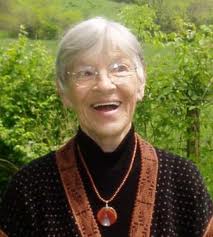
Bernadette Roberts
Bibliography
ENS: Bernadette Roberts, The Experience of No-Self. A Contemplative Journey. Boston and London: Shamballa, 1985.
PNS: Bernadette Roberts, Path to No-Self. Boston and London: Shamballa, 1985.
PNS2: Bernadette Roberts, “The Path to No-Self” in Stephan Bodian, ed. Timeless Visions, Healing Voices. Freedom, CA: Crossing Press, 1991.
What Bernadette Roberts calls her journey to No-Self, we call Ascension. Like the Buddha before her, she continued her story past the peak 3rd-Dimensional experience, Brahmajnana or God-Realization, seventh-chakra enlightenment. She sensed that she was not finished. She now went beyond any conception of a self, higher self, etc.
She pushed through stillpoint or the dark night of the soul to the experience of the No-Self that we call Ascension. In Buddhist language, she went from arahantship to buddhahood. This is her story.
The Journey
Within the traditional framework, the Christian notion of loss-of-self is generally regarded as a transformation of the ego or lower self into the true or higher self as it approaches union with God; throughout this journey, however, the self retains its individual uniqueness and never loses its ontological sense of personal selfhood. …
[During my] two-year journey [into the No-Self] … I experienced the falling away of everything I can call a self. It was a journey through an unknown passageway that led to a life so new and different that, despite forty years of varied contemplative experiences, I never suspected its existence. … I came upon a permanent state in which there was no self, not even a higher self, a true self, or anything that could be called a self. Clearly, I had fallen outside my own, as well as the traditional, frame of reference when I came upon a path that seemed to begin where the writers on the contemplative life had left off. (ENS, 9-10.)
Since I knew that this experience was not articulated in our contemplative literature, I went to the library to see if it could be found in the Eastern religions. … [In Hinduism] the final state is equivalent to the Christian experience of oneness or transforming union.
If a Hindu had what I call the no-self experience, it would be the sudden, unexpected disappearance of Atman-Brahman, the divine Self in the “cave of the heart,” and the disappearance of the cave as well. It would be the ending of God-consciousness, or transcendental consciousness — that seemingly bottomless experience of “being,” “consciousness,” and “bliss” that articulates the state of oneness. To regard this ending as the falling away of the ego is a grave error; ego must fall away before the state of oneness can be realized. The no-self experience is the falling away of this previously realized transcendent state.
Initially, when I looked into Buddhism, I did not find the experience of no-self there either; yet I intuited that it had to be there. The falling away of the ego is common to both Hinduism and Buddhism. Therefore, it would not account for the fact that Buddhism became a separate religion, nor would it account for the Buddhists’ insistence on no eternal Self – be it divine, individual, or the two in one. I felt that the key difference between these two religions was the no-self experience, the falling away of the true Self, Atman-Brahman.
Unfortunately what most Buddhist authors define as the no-self experience is actually the no-ego experience. The cessation of clinging, desire, the passions, etc., and the ensuing state of imperturbable peace and joy articulates the egoless state of oneness; it does not, however, articulate the no-self experience or the dimension beyond. (PNS2, 136-7.)
Four years later, however, I came across two lines attributed to Buddha describing his enlightenment experience. Referring to self as a house, he said, “All the rafters are broken now, the ridgepole is destroyed.” And there it was — the disappearance of the center, the ridgepole; without it, there can be no house, no self. When I read these lines, it was as if an arrow launched at the beginning of time had suddenly hit a bull’s-eye. It was a remarkable find. These lines are not a piece of philosophy, but an experiential account, and without the experiential account we really have nothing to go on. In the same verse he says, “Again a house thou shalt not build,” clearly distinguishing this experience from the falling away of the ego-center, after which a new, transformed self is built around a “true center,” a sturdy, balanced ridgepole. (PNS2, 137.)
At a certain point, when we have done all we can [to bring about an abiding union with the divine], the divine steps in and takes over. (PNS2, 131.)
Tomorrow we’ll look at what sense Berrnadette made of all this.

